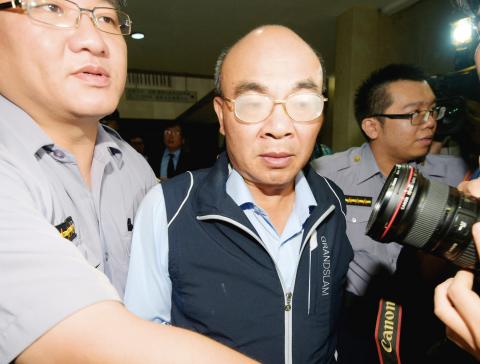Prosecutors investigating alleged financial irregularities and money laundering at Mega International Commercial Bank (兆豐銀行) yesterday indicted former Mega Financial Holding Co (兆豐金控) chairman Mckinney Tsai (蔡友才) on charges of forgery, insider trading and money laundering, and asked for a 12-year prison term.
The Taipei District Prosecutors’ Office also asked for a 10-year sentence for former Mega Bank chief secretary Wang Chi-pang (王起梆) and a four-year sentence for the former manager of Mega Bank’s New York branch.
The suspects are accused of violating the Banking Act (銀行法), the Financial Holding Company Act (金融控股公司法) and Securities and Exchange Act (證券交易法), Taipei Deputy Chief Prosecutor Chang Chieh-chin (張介欽) said.

Photo: Chiang Chia-ming, Taipei Times
Tsai resigned from Mega Financial in March and joined Chien Chi Asset Management (鑒機資產管理), owned by Ruentex Group (潤泰集團) chairman Samuel Yin (尹衍樑).
Local media have dubbed Tsai the financial sector’s “Kublai Khan,” as he was a high-paid banking executive with ambitions of building his own business empire, but things began to unravel after a probe uncovered suspected financial irregularities after the New York State Department of Financial Services imposed a US$180 million fine on Mega Bank’s New York branch for violations of US rules against money laundering.
“Tsai headed Mega Financial Holding, but he ignored banking and misconduct regulations. He used the financial resources of Mega Financial Holding for his own private schemes, with plans to establish his own business empire to become the top boss in Taiwanese investment banking,” Chang said.
Prosecutors said Tsai started the scheme with his top aide, Wang, two years ago, by procuring investment assets from Ruentex and other conglomerates to set up Chien Chi Asset Management Co (鑒機資產管理), then broke the law by granting a NT$6 billion (US$188 million) loan to Ruentex.
Prosecutors also said that Tsai engaged in insider trading by selling 321,000 shares of Mega Financial Holding between April and June, before news of the fine by New York state authorities became public and hit the share price, thereby profiting by about NT$568,876.
Chang said that while still running Mega Financial Holding in March last year, Tsai allegedly used his son’s name to set up the shell investment company, Nick & Ziv Capital Ltd, for which he worked with Wang to solicit capital from Taiwanese firms for the new company, which was affiliated with Chien Chi.
Prosecutors also accused Tsai of engaging in money laundering, as he used illegal means to receive his chairman’s salary of NT$225 million as an “administrative service fee” earlier this year and transferred it to TPP Capital Management Ltd, a company he set up in Hong Kong.
From there, the money was transferred to private accounts belonging to Tsai, Wang and Chien Chi chairman Steve Hsieh (謝泓源) at banks in other nations.
Prosecutors said Tsai, using this scheme, received illicit earnings of NT$168.7 million, Wang received NT$33.75 million and Hsieh received NT$22.5 million.

The Taiwanese passport ranked 33rd in a global listing of passports by convenience this month, rising three places from last month’s ranking, but matching its position in January last year. The Henley Passport Index, an international ranking of passports by the number of designations its holder can travel to without a visa, showed that the Taiwan passport enables holders to travel to 139 countries and territories without a visa. Singapore’s passport was ranked the most powerful with visa-free access to 192 destinations out of 227, according to the index published on Tuesday by UK-based migration investment consultancy firm Henley and Partners. Japan’s and

NATIONAL SECURITY THREAT: An official said that Guan Guan’s comments had gone beyond the threshold of free speech, as she advocated for the destruction of the ROC China-born media influencer Guan Guan’s (關關) residency permit has been revoked for repeatedly posting pro-China content that threatens national security, the National Immigration Agency said yesterday. Guan Guan has said many controversial things in her videos posted to Douyin (抖音), including “the red flag will soon be painted all over Taiwan” and “Taiwan is an inseparable part of China,” while expressing hope for expedited “reunification.” The agency received multiple reports alleging that Guan Guan had advocated for armed reunification last year. After investigating, the agency last month issued a notice requiring her to appear and account for her actions. Guan Guan appeared as required,

Japan and the Philippines yesterday signed a defense pact that would allow the tax-free provision of ammunition, fuel, food and other necessities when their forces stage joint training to boost deterrence against China’s growing aggression in the region and to bolster their preparation for natural disasters. Japan has faced increasing political, trade and security tensions with China, which was angered by Japanese Prime Minister Sanae Takaichi’s remark that a Chinese attack on Taiwan would be a survival-threatening situation for Japan, triggering a military response. Japan and the Philippines have also had separate territorial conflicts with Beijing in the East and South China

A strong cold air mass is expected to arrive tonight, bringing a change in weather and a drop in temperature, the Central Weather Administration (CWA) said. The coldest time would be early on Thursday morning, with temperatures in some areas dipping as low as 8°C, it said. Daytime highs yesterday were 22°C to 24°C in northern and eastern Taiwan, and about 25°C to 28°C in the central and southern regions, it said. However, nighttime lows would dip to about 15°C to 16°C in central and northern Taiwan as well as the northeast, and 17°C to 19°C elsewhere, it said. Tropical Storm Nokaen, currently